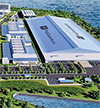Baltimore is no stranger to reinvention. From its days as a manufacturing hub to its current identity as a biomedical and research powerhouse, the city has long been a proving ground for what may be next. Now, thanks to a unique partnership between Johns Hopkins University and the Maryland Department of Commerce, Baltimore is emerging as a pioneer of a new frontier: training an AI-literate workforce that can serve every sector of the economy.
"We know that AI is not just a technology—it’s a way of thinking, a way of leading," said Dr. Supriya Munshaw, Associate Dean for Academic Programs and Associate Professor of Practice at Johns Hopkins Carey Business School. "That’s why we created the AI for Business Certificate—not for coders, but for decision-makers who need to understand how AI will impact their business operations, logistics, healthcare delivery, or manufacturing workflows."
The graduate program at Johns Hopkins is one of the first of its kind. It’s designed for working professionals, executives, and sector leaders who don’t necessarily have a background in programming or data science. The curriculum emphasizes responsible implementation, AI strategy, and cross-functional fluency—skills increasingly in demand across a range of industries that are embracing automation and machine learning.
AI is not just a technology—it’s a way of thinking, a way of leading.
At the same time, the state of Maryland’s Department of Commerce is strategically aligning state workforce development efforts to meet this growing demand.
"We are investing in AI from the ground up, which means not just supporting research, but ensuring we have the right talent pipeline to attract and grow businesses here," said Kimberly Mentzell, the state's Director of Emerging Technologies. "What’s exciting is how seamlessly we’re seeing alignment between academia and our economic development strategy. Hopkins has been a huge driver in that."
This alignment is no accident. Mentzell noted that Maryland’s emerging technology sub-cabinet—created under the governor’s office—is actively coordinating policy across workforce, education, and commerce to ensure the state is competitive in the AI economy. Hopkins’ program feeds directly into those policy efforts, offering data, insights, and even interns who can embed in partner companies.
The result is a region uniquely positioned to serve companies looking to scale AI efforts responsibly and affordably—especially in sectors like healthcare, logistics, life sciences, and advanced manufacturing, which are already strongholds for Maryland.
What’s exciting is how seamlessly we’re seeing alignment between academia and our economic development strategy.
Baltimore’s story is particularly compelling for corporate site selectors evaluating tech talent markets outside the big-ticket coastal metros. In a tight labor market, with AI skills in high demand and short supply, the city offers a combination of: A premier academic institution producing cross-industry AI leaders; A proactive state government building AI into its workforce programs; Proximity to federal agencies and cybersecurity clusters in D.C.; A lower cost of doing business than Boston, San Francisco, or New York.
"We’re not training workers for a single company or product," Munshaw emphasized. "We’re equipping leaders who can bring AI literacy to every department, every team, every strategy conversation. That’s what businesses are telling us they need—and we’re listening."
As more companies look to adopt AI as a horizontal capability, not just a vertical silo, Baltimore may well be ahead of the curve. It’s building the academic, civic and workforce infrastructure to make AI work for real-world businesses.



